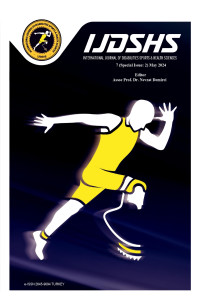The Impact of Aquatic Rehabilitation Exercises on Improving Motor Abilities In Spastic Paralysis Patients Aged (6-8) Years
Abstract
The researchers aim to address the rehabilitation of children with simple spastic cerebral palsy, emphasizing the importance of early intervention for faster and better rehabilitation. The study also aims to develop exercises and use an aquatic environment for the rehabilitation of children aged 6-8 years with simple spastic cerebral palsy, assessing the impact of aquatic exercises on the rehabilitation and motor abilities of this age group. The research sample, consisting of five individuals with simple spastic cerebral palsy, was purposively selected from the Happiness Institute for Physically Disabled Individuals in Baghdad. The researchers ensured homogeneity in variables such as height, weight, age, and severity of the condition to establish a common starting point for the intervention. The researchers condensed their findings into an aquatic therapy method, believing in the scientific and field capabilities of individuals, provided there is access to modern information, devices, and advanced means, conducting scientific experiments to enhance the effectiveness of the beneficiaries. The significance of the research lies in the rehabilitation of individuals with spastic cerebral palsy, aiming to save time and effort and increase motivation for faster, better, more advanced, and enjoyable rehabilitation for them. The designated place for treatment at the Happiness Institute for Physically Disabled Individuals with Simple Spastic Cerebral Palsy is for children aged 6-8 years, specifically males.
References
- Ibrahim, K. (1999). The impact of motor program on developing the mental ability level and motor skills performance of children with speech disorders. University of Baghdad. (Doctoral Thesis).
- Ibrahim, M. A. M. (2000). Fundamentals of Scientific Research for the Preparation of University Theses (Vol. 1). Al-Waraq Foundation. [CrossRef]
- Mufti, I. H. (1998). Modern sports training - Planning, application, and leadership. Dar Al-Fikr Al-Arabi.
- Nasif, A. A. & Hussein, Q. H. (1998). Principles of sports training science. Higher Education Printing Press.
- Obeid, M. S. (1999). The motor disability (Vol. 1). Dar Al-Safaa for Publishing and Distribution.
- Sadek, T. M. (2000). Motor rehabilitation therapy program. Helwan University. (Doctoral Thesis).
- Saleh, R. H. (2018). The effect of aquatic environment exercises on knee and ankle joint rehabilitation indicated by range of motion and some chemical variables in athletes with simple leg fractures. University of Al-Qadisiyah. (Doctoral Thesis).
- Samiha, K. M. (2010). Physical therapy - Tools and techniques. Nas for Printing.
- Singer, R. N. (1982). Motor learning and human performance. Macmillan.
- Subhan, M. H. (2007). Cerebral palsy and its relationship to the performance method of some basic motor patterns in children aged (10-12) years. University of Baghdad. (Master's Thesis).
Abstract
References
- Ibrahim, K. (1999). The impact of motor program on developing the mental ability level and motor skills performance of children with speech disorders. University of Baghdad. (Doctoral Thesis).
- Ibrahim, M. A. M. (2000). Fundamentals of Scientific Research for the Preparation of University Theses (Vol. 1). Al-Waraq Foundation. [CrossRef]
- Mufti, I. H. (1998). Modern sports training - Planning, application, and leadership. Dar Al-Fikr Al-Arabi.
- Nasif, A. A. & Hussein, Q. H. (1998). Principles of sports training science. Higher Education Printing Press.
- Obeid, M. S. (1999). The motor disability (Vol. 1). Dar Al-Safaa for Publishing and Distribution.
- Sadek, T. M. (2000). Motor rehabilitation therapy program. Helwan University. (Doctoral Thesis).
- Saleh, R. H. (2018). The effect of aquatic environment exercises on knee and ankle joint rehabilitation indicated by range of motion and some chemical variables in athletes with simple leg fractures. University of Al-Qadisiyah. (Doctoral Thesis).
- Samiha, K. M. (2010). Physical therapy - Tools and techniques. Nas for Printing.
- Singer, R. N. (1982). Motor learning and human performance. Macmillan.
- Subhan, M. H. (2007). Cerebral palsy and its relationship to the performance method of some basic motor patterns in children aged (10-12) years. University of Baghdad. (Master's Thesis).
Details
| Primary Language | English |
|---|---|
| Subjects | Physical Training, Sports and Physical Activity For Disabled |
| Journal Section | Original Article |
| Authors | |
| Early Pub Date | May 9, 2024 |
| Publication Date | May 20, 2024 |
| Submission Date | January 17, 2024 |
| Acceptance Date | April 17, 2024 |
| Published in Issue | Year 2024 Volume: 7 Issue: (Special Issue 2): The Second International Scientific Conference: Sports for Health and Sustainable Development, (SHSD, 2024) |


